Ante Wang
Countering the Over-Reliance Trap: Mitigating Object Hallucination for LVLMs via a Self-Validation Framework
Jan 30, 2026Abstract:Despite progress in Large Vision Language Models (LVLMs), object hallucination remains a critical issue in image captioning task, where models generate descriptions of non-existent objects, compromising their reliability. Previous work attributes this to LVLMs' over-reliance on language priors and attempts to mitigate it through logits calibration. However, they still lack a thorough analysis of the over-reliance. To gain a deeper understanding of over-reliance, we conduct a series of preliminary experiments, indicating that as the generation length increases, LVLMs' over-reliance on language priors leads to inflated probability of hallucinated object tokens, consequently exacerbating object hallucination. To circumvent this issue, we propose Language-Prior-Free Verification to enable LVLMs to faithfully verify the confidence of object existence. Based on this, we propose a novel training-free Self-Validation Framework to counter the over-reliance trap. It first validates objects' existence in sampled candidate captions and further mitigates object hallucination via caption selection or aggregation. Experiment results demonstrate that our framework mitigates object hallucination significantly in image captioning task (e.g., 65.6% improvement on CHAIRI metric with LLaVA-v1.5-7B), surpassing the previous SOTA methods. This result highlights a novel path towards mitigating hallucination by unlocking the inherent potential within LVLMs themselves.
Orchestrating Tokens and Sequences: Dynamic Hybrid Policy Optimization for RLVR
Jan 09, 2026Abstract:Reinforcement Learning with Verifiable Rewards (RLVR) offers a promising framework for optimizing large language models in reasoning tasks. However, existing RLVR algorithms focus on different granularities, and each has complementary strengths and limitations. Group Relative Policy Optimization (GRPO) updates the policy with token-level importance ratios, which preserves fine-grained credit assignment but often suffers from high variance and instability. In contrast, Group Sequence Policy Optimization (GSPO) applies single sequence-level importance ratios across all tokens in a response that better matches sequence-level rewards, but sacrifices token-wise credit assignment. In this paper, we propose Dynamic Hybrid Policy Optimization (DHPO) to bridge GRPO and GSPO within a single clipped surrogate objective. DHPO combines token-level and sequence-level importance ratios using weighting mechanisms. We explore two variants of the mixing mechanism, including an averaged mixing and an entropy-guided mixing. To further stabilize training, we employ a branch-specific clipping strategy that constrains token-level and sequence-level ratios within separate trust regions before mixing, preventing outliers in either branch from dominating the update. Across seven challenging mathematical reasoning benchmarks, experiments on both dense and MoE models from the Qwen3 series show that DHPO consistently outperforms GRPO and GSPO. We will release our code upon acceptance of this paper.
Can LLMs Track Their Output Length? A Dynamic Feedback Mechanism for Precise Length Regulation
Jan 07, 2026Abstract:Precisely controlling the length of generated text is a common requirement in real-world applications. However, despite significant advancements in following human instructions, Large Language Models (LLMs) still struggle with this task. In this work, we demonstrate that LLMs often fail to accurately measure their response lengths, leading to poor adherence to length constraints. To address this issue, we propose a novel length regulation approach that incorporates dynamic length feedback during generation, enabling adaptive adjustments to meet target lengths. Experiments on summarization and biography tasks show our training-free approach significantly improves precision in achieving target token, word, or sentence counts without compromising quality. Additionally, we demonstrate that further supervised fine-tuning allows our method to generalize effectively to broader text-generation tasks.
Don't Miss the Forest for the Trees: In-Depth Confidence Estimation for LLMs via Reasoning over the Answer Space
Nov 18, 2025Abstract:Knowing the reliability of a model's response is essential in application. With the strong generation capabilities of LLMs, research has focused on generating verbalized confidence. This is further enhanced by combining chain-of-thought reasoning, which provides logical and transparent estimation. However, how reasoning strategies affect the estimated confidence is still under-explored. In this work, we demonstrate that predicting a verbalized probability distribution can effectively encourage in-depth reasoning for confidence estimation. Intuitively, it requires an LLM to consider all candidates within the answer space instead of basing on a single guess, and to carefully assign confidence scores to meet the requirements of a distribution. This method shows an advantage across different models and various tasks, regardless of whether the answer space is known. Its advantage is maintained even after reinforcement learning, and further analysis shows its reasoning patterns are aligned with human expectations.
A Multi-Agent Framework with Automated Decision Rule Optimization for Cross-Domain Misinformation Detection
Mar 30, 2025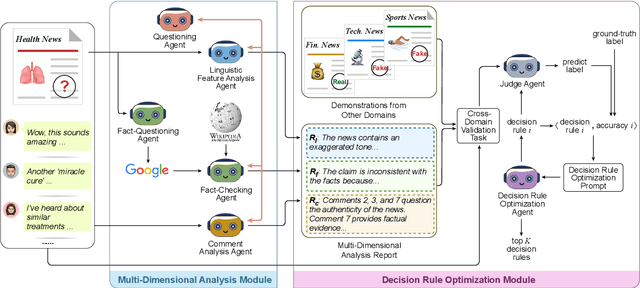
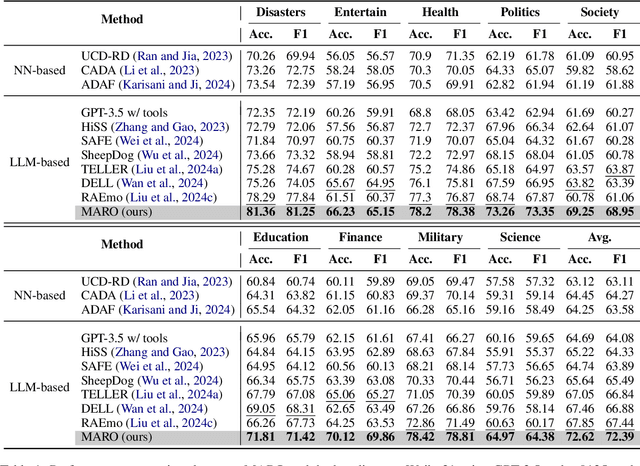
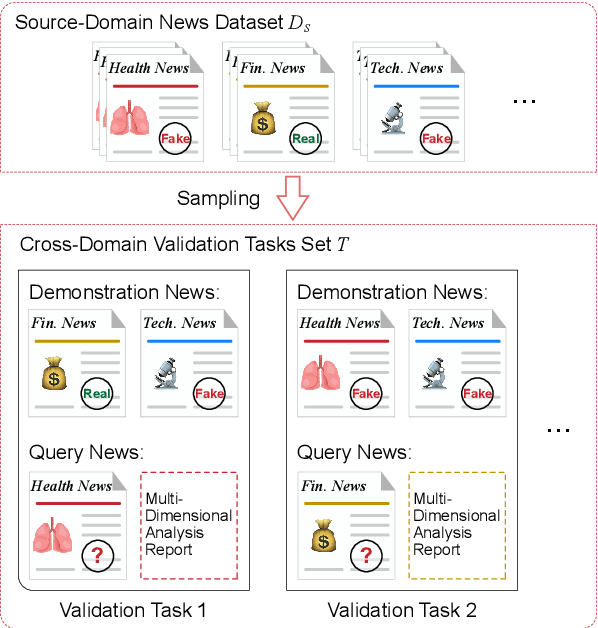
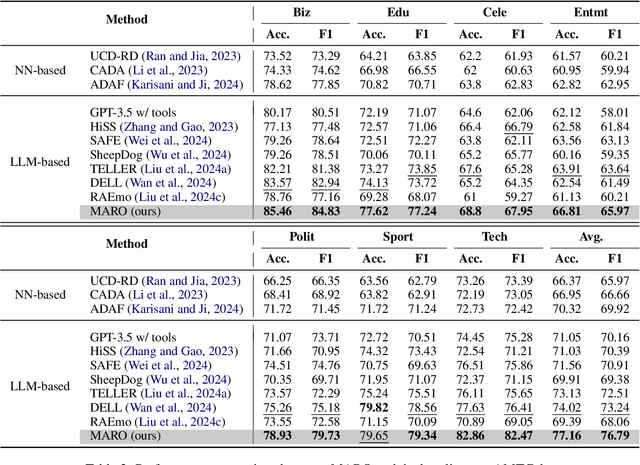
Abstract:Misinformation spans various domains, but detection methods trained on specific domains often perform poorly when applied to others. With the rapid development of Large Language Models (LLMs), researchers have begun to utilize LLMs for cross-domain misinformation detection. However, existing LLM-based methods often fail to adequately analyze news in the target domain, limiting their detection capabilities. More importantly, these methods typically rely on manually designed decision rules, which are limited by domain knowledge and expert experience, thus limiting the generalizability of decision rules to different domains. To address these issues, we propose a MultiAgent Framework for cross-domain misinformation detection with Automated Decision Rule Optimization (MARO). Under this framework, we first employs multiple expert agents to analyze target-domain news. Subsequently, we introduce a question-reflection mechanism that guides expert agents to facilitate higherquality analysis. Furthermore, we propose a decision rule optimization approach based on carefully-designed cross-domain validation tasks to iteratively enhance the effectiveness of decision rules in different domains. Experimental results and in-depth analysis on commonlyused datasets demonstrate that MARO achieves significant improvements over existing methods.
Investigating Inference-time Scaling for Chain of Multi-modal Thought: A Preliminary Study
Feb 17, 2025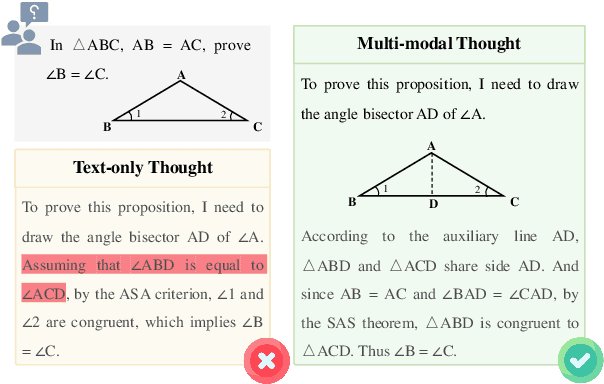
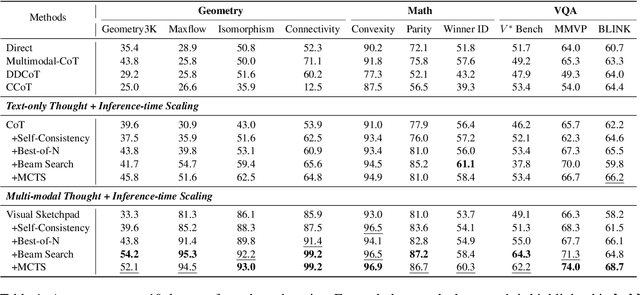
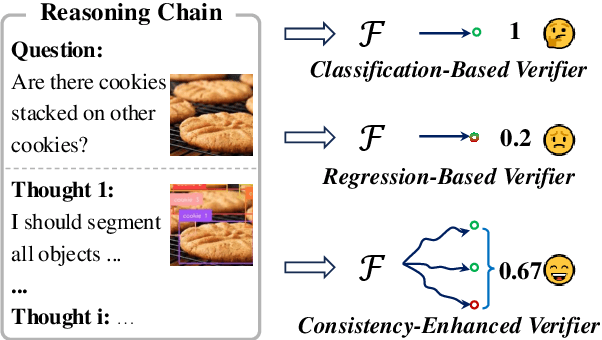

Abstract:Recently, inference-time scaling of chain-of-thought (CoT) has been demonstrated as a promising approach for addressing multi-modal reasoning tasks. While existing studies have predominantly centered on text-based thinking, the integration of both visual and textual modalities within the reasoning process remains unexplored. In this study, we pioneer the exploration of inference-time scaling with multi-modal thought, aiming to bridge this gap. To provide a comprehensive analysis, we systematically investigate popular sampling-based and tree search-based inference-time scaling methods on 10 challenging tasks spanning various domains. Besides, we uniformly adopt a consistency-enhanced verifier to ensure effective guidance for both methods across different thought paradigms. Results show that multi-modal thought promotes better performance against conventional text-only thought, and blending the two types of thought fosters more diverse thinking. Despite these advantages, multi-modal thoughts necessitate higher token consumption for processing richer visual inputs, which raises concerns in practical applications. We hope that our findings on the merits and drawbacks of this research line will inspire future works in the field.
A Dual-Perspective Metaphor Detection Framework Using Large Language Models
Dec 23, 2024



Abstract:Metaphor detection, a critical task in natural language processing, involves identifying whether a particular word in a sentence is used metaphorically. Traditional approaches often rely on supervised learning models that implicitly encode semantic relationships based on metaphor theories. However, these methods often suffer from a lack of transparency in their decision-making processes, which undermines the reliability of their predictions. Recent research indicates that LLMs (large language models) exhibit significant potential in metaphor detection. Nevertheless, their reasoning capabilities are constrained by predefined knowledge graphs. To overcome these limitations, we propose DMD, a novel dual-perspective framework that harnesses both implicit and explicit applications of metaphor theories to guide LLMs in metaphor detection and adopts a self-judgment mechanism to validate the responses from the aforementioned forms of guidance. In comparison to previous methods, our framework offers more transparent reasoning processes and delivers more reliable predictions. Experimental results prove the effectiveness of DMD, demonstrating state-of-the-art performance across widely-used datasets.
Not All Languages are Equal: Insights into Multilingual Retrieval-Augmented Generation
Oct 29, 2024



Abstract:RALMs (Retrieval-Augmented Language Models) broaden their knowledge scope by incorporating external textual resources. However, the multilingual nature of global knowledge necessitates RALMs to handle diverse languages, a topic that has received limited research focus. In this work, we propose \textit{Futurepedia}, a carefully crafted benchmark containing parallel texts across eight representative languages. We evaluate six multilingual RALMs using our benchmark to explore the challenges of multilingual RALMs. Experimental results reveal linguistic inequalities: 1) high-resource languages stand out in Monolingual Knowledge Extraction; 2) Indo-European languages lead RALMs to provide answers directly from documents, alleviating the challenge of expressing answers across languages; 3) English benefits from RALMs' selection bias and speaks louder in multilingual knowledge selection. Based on these findings, we offer advice for improving multilingual Retrieval Augmented Generation. For monolingual knowledge extraction, careful attention must be paid to cascading errors from translating low-resource languages into high-resource ones. In cross-lingual knowledge transfer, encouraging RALMs to provide answers within documents in different languages can improve transfer performance. For multilingual knowledge selection, incorporating more non-English documents and repositioning English documents can help mitigate RALMs' selection bias. Through comprehensive experiments, we underscore the complexities inherent in multilingual RALMs and offer valuable insights for future research.
Mitigating the Negative Impact of Over-association for Conversational Query Production
Sep 29, 2024Abstract:Conversational query generation aims at producing search queries from dialogue histories, which are then used to retrieve relevant knowledge from a search engine to help knowledge-based dialogue systems. Trained to maximize the likelihood of gold queries, previous models suffer from the data hunger issue, and they tend to both drop important concepts from dialogue histories and generate irrelevant concepts at inference time. We attribute these issues to the over-association phenomenon where a large number of gold queries are indirectly related to the dialogue topics, because annotators may unconsciously perform reasoning with their background knowledge when generating these gold queries. We carefully analyze the negative effects of this phenomenon on pretrained Seq2seq query producers and then propose effective instance-level weighting strategies for training to mitigate these issues from multiple perspectives. Experiments on two benchmarks, Wizard-of-Internet and DuSinc, show that our strategies effectively alleviate the negative effects and lead to significant performance gains (2%-5% across automatic metrics and human evaluation). Further analysis shows that our model selects better concepts from dialogue histories and is 10 times more data efficient than the baseline. The code is available at https://github.com/DeepLearnXMU/QG-OverAsso.
LiteSearch: Efficacious Tree Search for LLM
Jun 29, 2024Abstract:Recent research suggests that tree search algorithms (e.g. Monte Carlo Tree Search) can dramatically boost LLM performance on complex mathematical reasoning tasks. However, they often require more than 10 times the computational resources of greedy decoding due to wasteful search strategies, making them difficult to be deployed in practical applications. This study introduces a novel guided tree search algorithm with dynamic node selection and node-level exploration budget (maximum number of children) calculation to tackle this issue. By considering the search progress towards the final answer (history) and the guidance from a value network (future) trained without any step-wise annotations, our algorithm iteratively selects the most promising tree node before expanding it within the boundaries of the allocated computational budget. Experiments conducted on the GSM8K and TabMWP datasets demonstrate that our approach not only offers competitive performance but also enjoys significantly lower computational costs compared to baseline methods.
 Add to Chrome
Add to Chrome Add to Firefox
Add to Firefox Add to Edge
Add to Edge